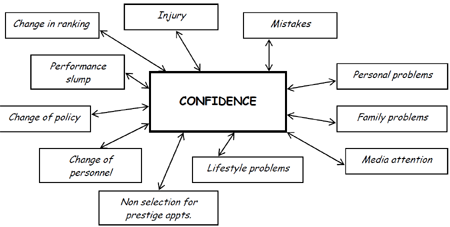 Fra den meritterte dommerinstruktøren Alan Richardson fra England har vi mottatt en serie på 10 artikler som fokuserer på hvordan en mentor eller dommerinstruktør bør jobbe med å utvikle en dommer, og ikke minst de mentale ferdighetene som kommer inn i bildet i dette arbeidet. Selv om artiklene ikke er skrevet direkte mot dommere tar vi dem med i samlingen av faglitteratur. Grunnen er at de inneholder mange gode poeng for alle som er involvert i dommerutvikling, både dommerne og instruktørene bør kunne fange opp noen tips fra Richardson. Artiklene heter "Mental Skills for Mentors and Referee Instructors", og her er den første i serien: "Performance".
Fra den meritterte dommerinstruktøren Alan Richardson fra England har vi mottatt en serie på 10 artikler som fokuserer på hvordan en mentor eller dommerinstruktør bør jobbe med å utvikle en dommer, og ikke minst de mentale ferdighetene som kommer inn i bildet i dette arbeidet. Selv om artiklene ikke er skrevet direkte mot dommere tar vi dem med i samlingen av faglitteratur. Grunnen er at de inneholder mange gode poeng for alle som er involvert i dommerutvikling, både dommerne og instruktørene bør kunne fange opp noen tips fra Richardson. Artiklene heter "Mental Skills for Mentors and Referee Instructors", og her er den første i serien: "Performance".
Part 1: Performance
5 steps to Performance:

Performance has many facets, you cannot break an individual into parts. Performance is relevant to age and gender.
Problems associated with performance:
- Is this a can’t do or won’t do – former is technical, latter is attitude.
- When and how do problems occur.
- Are problems related to one area of performance or several?
- What thoughts and feelings does the individual associate with the problem(s).
- Are the problem the result of pressure? Practice is okay, but not in the game.
Individual assessment:
Analyse and assess strengths and weaknesses.
Priorities for change / improvement.
Behaviour = Personality x Environment.
Video Analysis:
Question for observation:
- What happened?
- What was I thinking and feeling at the time?
- What was good (or bad) about the experience?
- What else could I have done?
- If it happened again, what would I do?
- If I wanted to change this behaviour, could I?
Success in mental skills training is U vs. U ! Develop a high level of intrinsic motivation – what you desire rather than others!
Action Planning:
- Assess the problem(s).
- Set goals – identify and achieve progressive steps to improvement.
- Visualisation – see yourself as you want to be.
- Practice – act out the visualisation – learn from mistakes!
- Monitor – check your progress, listen and look.
- Automate – repeat good actions and behaviour.
- Enjoy your new behaviour and progress
Confidence:

Characteristics of Confidence:
- Ability to make quick judgements about individuals’ ability to cope with the demands of international competition.
- Look for clear signs, both verbal and non verbal, that the official is confident in their ability to succeed at this level.
Signs of high confidence:
- Self belief- a “can do” attitude.
- Projecting positive body language.
- Enjoying the competition (even smiling).
- Not worrying about mistakes.
- Not blaming others for problems.
- Calm and controlled throughout.
- Self talk and to others in a positive manner.
- Good concentration.
- Performing without a need to impress others.
- Accepting their strengths and weaknesses.
Steps to building confidence:
Confidence is built upon experience. Good official use “deja vu” to good effect. Being prepared for the expected and the unexpected. Being willing to endure fear, mistakes, emotions and reactions to build confidence for the future.
Success breeds confidence. The ability to prepare for and handle pressure enables individuals to progress.
Confidence is based on continued achievement no matter how small or how long it takes. The “end goal” must always be the big picture.
Commit to good preparation:
Confidence comes from success and a feeling that one can cope with adversity. Achieving small goals regularly and feeling good about it, helps to reinforce confidence and coping skills for bigger goals.
Confidence requires training in positive self-talk and rejection of negative self-talk.
“Confidence is contagious, so is lack of confidence” .
The ability of officials to ignore what they cannot control whilst concentrating on the one thing they can control – their minds. Self discipline and concentration will shut out environmental distractions. Encourage officials to maintain game routines and procedures in any environment.
Boosting Confidence:
Of all the relationships that can influence the officials self confidence the one with the Instructor / Supervisor is the most powerful. The Instructor with control of selection, feedback and training has the power to shape the officials attitude positively or negatively.
Instructors can help officials acquire positive attitudes and confidence by teaching and demonstrating in such a way that the official feels motivated and able to meet game challenges.
Officials need to be criticized when performances do not meet the required standard, but in such a way as to promote the desire to grow and improve.
Summary:
Instructors who wish to improve officials self-esteem and confidence may want to consider the following:
- Make learning fun and challenging.
- Treat all officials with respect.
- Notice and reward good performance.
Alan Richardson
